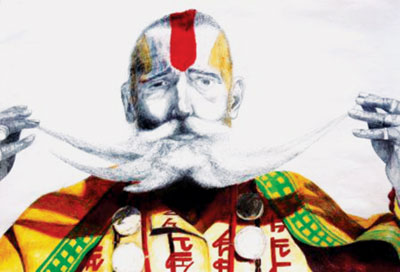All Nonfiction
- Bullying
- Books
- Academic
- Author Interviews
- Celebrity interviews
- College Articles
- College Essays
- Educator of the Year
- Heroes
- Interviews
- Memoir
- Personal Experience
- Sports
- Travel & Culture
All Opinions
- Bullying
- Current Events / Politics
- Discrimination
- Drugs / Alcohol / Smoking
- Entertainment / Celebrities
- Environment
- Love / Relationships
- Movies / Music / TV
- Pop Culture / Trends
- School / College
- Social Issues / Civics
- Spirituality / Religion
- Sports / Hobbies
All Hot Topics
- Bullying
- Community Service
- Environment
- Health
- Letters to the Editor
- Pride & Prejudice
- What Matters
- Back
Summer Guide
- Program Links
- Program Reviews
- Back
College Guide
- College Links
- College Reviews
- College Essays
- College Articles
- Back
Foreign Words
To examine the centuries-old guiding principle underpinning the Chinese society I will first start with a popular televised singing competition called the “Super Girl Contest” – the Chinese version of “American Idol.” The thing worth noting of this show is not the intense competition between contestants, but the disproportionate amount of time devoted to exchange emotional support between singers and judges. Contrary to common expectations, the show spends more time consoling the losers than celebrating the winners. For what reason? To protect the losers from losing face. Transitioning to a more serious occasion, during President Hu Jintao’s 2006 visit to the U.S. he was refused a full state dinner and was instead offered a state lunch. To save face, the meal was not even reported in the Chinese media. A similar notion of “face” is manifested in Chinese family and friend gatherings. Next time you dine at a Chinese restaurant pay attention to the Chinese competing over the bill for the sake of politeness and winning face. It is truly entertaining to watch. From television shows to diplomatic contact between nation leaders to family gatherings, the concept of mianzi is ingrained in every Chinese mind; its impact is evident in all aspects of Chinese society.
According to google translate, mianzi means face, reputation, or prestige. In the simplest sense, mianzi is foundation for building mutual respect, trust, and interpersonal relationships. However, the concept of mianzi is such an unique social construct of the Chinese culture that no translation can justly convey all of its fine nuances. In fact, this word embodies qualities that may not be fully expressed even in the Chinese language. It is enriched by 4000 years of linguistic evolution and is woven into the fabric of social relationships in modern China. The English phrase “to save face” is merely an one-dimensional portrait of the Chinese “face,” which can be granted, lost, lent, won, and fought for. My first experience with mianzi was in third grade when a group of popular kid “gave me face” by inviting me to sit with them during lunch. In return I was expected to keep a mental checklist of all the favors I owed them and pay them back in the social currency known as “face.”
The extensive cultural and historical context embedded in the word mianzi demands a deep understanding of Chinese traditional values, culture, and contemporary society for the meaning to be fully grasped.Therefore, every attempt to translate the word seems to be a futile endeavor. The concept of face, though present in every culture, is salient in Chinese culture.Traditionally, Chinese culture has de-emphasized the sense of self to the extent that individualism is considered immoral. The Chinese face underscores family honor and collective interests, while the Western face emphasizes personal integrity and individual perspective. It appears so that the western perception of face is an antithesis of the Chinese face. To translate the concept of mianzi to Western languages, or any other language, ultimately strips away its inherent meaning.
I believe it is a dangerous act to translate words that are special to a specific culture to other language. By translating a foreign concept to the familiar context of our mother tongue, we personalize the concept to fit it into our predetermined boxes, which prevents us from truly understanding the original meaning of the concept. We miss out on the chance to discern the nuance and unique layers of culture embedded in each word. For some people a simple translation even replaces the need to learn a new language. This I see as a warning sign of diminishing cultural diversity.Traveling to fifteen different countries and living growing up in a bilingual environment have shaped my values, among which is the importance of cultural awareness and multilingualism. I wholeheartedly agree with Nelson Mandela’s statement, “If you talk to a man in a language he understands, that goes to his head. If you talk to him in his language, that goes to his heart.” Therefore, my goal as an anthropologist is to challenge myself to learn as many languages as possible to speak to people in their native language, understand their culture at personal level, and fill in what is lost in translation.

Similar Articles
JOIN THE DISCUSSION
This article has 0 comments.
